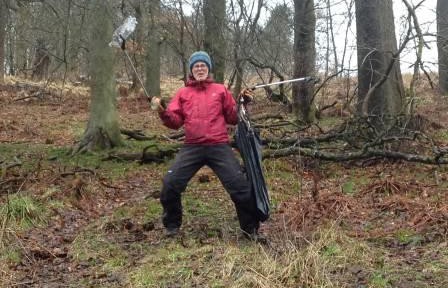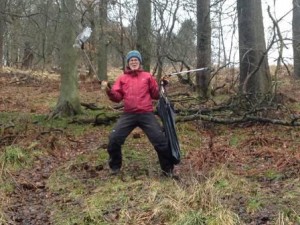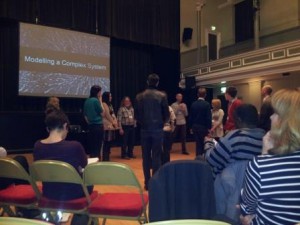
As the saying goes, time flies when you submerse yourself head first into a new job and company! I’ve been at the Cumbernauld Living Landscape for just under two months and it has already been a varied, challenging and confusing time. I’ve learnt so much and there is no sign of this stopping. I’ve attended conferences and training, visited surprisingly natural urban reserves and met many exciting people. I seem to have crossed the boundary into that almost mythical group of people who can honestly say they really enjoy going into work! I’d like to share with you an example as to why I feel this way.
An encounter that has stuck with me this month happened whilst out on one of our reserves. The proactive Friends of Cumbernauld Glen group had organised a litter pick which Tracy and myself went along to support. We were hardly needed though: as they’d worked hard publicising the event, they’d managed to recruit around 20 people to help on the day. Over the course of the day, bags and bags of rubbish were removed (top find of the day: pink lightsaber) and as we were thinking about wrapping up, a member of the public approached Tracy and myself to ask: “Why’s this not getting done over where I live?”
Now I feel it is easy to point fingers and lay the blame; I can fully understand why members of the public look to landowners and expect them to have the money and resources to manage reserves to the highest standard. Equally, I can understand the landowner’s perspective and the trap of falling into a defensive position about (for example) funding or conflicts of interest that affect the way land is getting managed. The crux of this conflict is: where do you believe the responsibility to act lies?
In this example, it is obvious that the person who approached us thought as “those wildlife people” it was our job to act. This blog isn’t about portioning blame or responsibility – it is about opening up the dialogue around this and turning it into an opportunity to achieve something. We chatted to this person for some time and the news that a community group, not an organisation, had set up the litter pick came as a bit of a shock. It didn’t take long from here to begin discussing how we could work together to do something similar in this person’s area. It seems simple in text. Not going first to an external scapegoat, but turning the question internally, the old: “ask not what your country can do for you, ask what you can do for your country.”
I was fortunate enough to be able to attend the Scottish Communities Climate Action Network AGM and I found it really inspiring to see other great examples of people working in, and for, their communities’ benefit. The lesson that I’ve taken from this is that simple ideas are powerful. The desire to share a particular interest or skill could be the start of a grassroots group. Breaking down a problem into parts might lead to a solution you hadn’t thought of previously, but are able to act upon.
I feel like I’m beginning to understand why community empowerment is really crucial to action. So, this is my personal frame for the rest of the placement, something which excites and scares me: opening up and acting upon the question of what I, with my community, can do for wildlife, not what wildlife can do for me.

